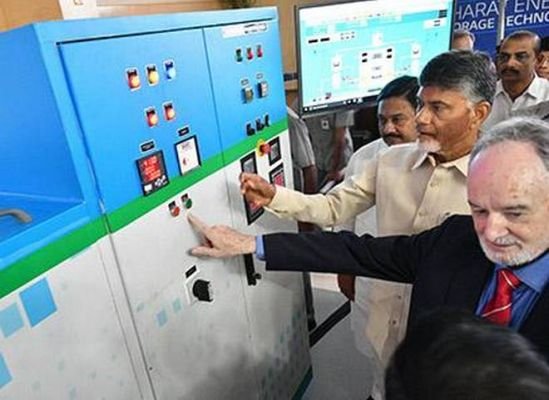Chief Minister N Chandrababu Naidu will unveil the world’s first-ever thermal battery in Andhra Pradesh.
Manufactured by the Bharat Energy Storage Technology Private Limited (BEST), the first-of-its-kind cell is aimed at boosting up renewable sources of energy production, instead of non-renewable fossil fuel-based energy generation.
Thermal battery technology: How it works
Conventional battery technology is based on the system of charging/discharging cycles that are driven by electricity.
Thermal batteries, on the other hand, use thermal energy to operate, i.e., the energy created by temperature differences. Therefore, the energy transfer in thermal batteries helps store heat when heat travels from one part of the battery setup to the other. For that to happen, a thermal battery consists of two parts: a cool zone known as sink, and a hot source called source. Both these sides consist of compounds known as phase-changing materials (PCMs), which can change their state of matter on the basis of a physical/chemical reaction.
When the sink of a thermal battery receives heat, it transforms physically or chemically, thereby storing energy, while the source cools down. During operation, the sink is cooled down, so it releases the stored energy, while the source heats up. Depending on the nature of the battery, the system can derive heat from any source, which makes a thermal battery very versatile.
 Thermal battery technology was patented in India by Dr Patrick Glynn in 2016.
Thermal battery technology was patented in India by Dr Patrick Glynn in 2016.
The BEST also aims to set up a Greenfield Project in India, at an estimated cost of Rs. 660 crores, through which nearly 3000 jobs are expected to be created within three years’ time.
From a capacity of 1000 megawatts, BEST would enhance the same to 10 gigawatts in the next six to seven years. Batteries suited for telecommunications, mini or microgrids and electric buses would be manufactured in the first phase.
Under the project, electric buses, produced in collaboration with Bilva Motors, a global consortium, could deliver an 800-kilometre range with a single charge, with the help of BEST’s thermal cells. The cell can be customised to be charged in four or eight hours, depending on the source. It can also provide output ranging between 5Kwh and 1 Mwh.
The plant in Andhra Pradesh is expected to start commercial operations by May 2019.
Reference- ET, Indian Express, NDTV






